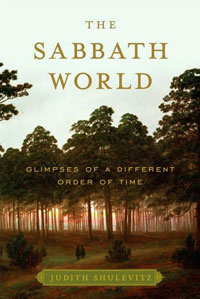The Seventh Day

There is an odd reversal of polarities when the notion of resting and setting aside a period of time for a kind of imposed tranquility is considered utopian. But of course the achievement of states-of-affairs, when the modifier “24/7” is viewed as a positive attribute implying at the least that relentless vigilance and ceaseless activity is a high value, is not a circumstance foreseen even from the frenzied optimism of the post-industrial centers of ambition.
However you view the notion of a day of rest (known in the Judeo-Christian world as the Sabbath), it is clear the world has transformed considerably in viewing what was once institutionalized. (In my home state there were so called blue laws prohibiting commerce and the sale of intoxicants on Sundays.) In The Sabbath World: Glimpses of a Different Order of Time (Random House) Judy Shulevitz (Lingua Franca, Slate) has conjured a hybrid of a meditation-qua-memoir on this notion of taking a day off. She explains:
The Sabbath WorldThe Sabbath World
The Sabbath World is a smart and thoughtful, good-humored investigation into a tradition that appears to have been trampled by the stampede of hyper-velocity human (though it remains to be seen if such is human) activity. Shulevitz concludes:
But the impossible seems to me to have become the necessary. I think we need the Sabbath, or something like it, to help us hold on to our humanity as we hurtle into a rapidly accelerating future.
